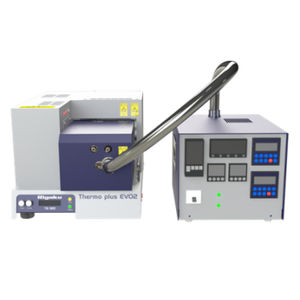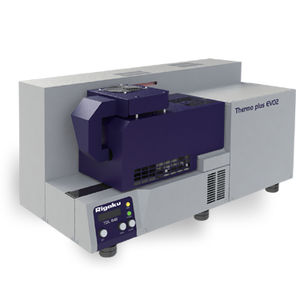
Air analyzer TMA temperatureelementalbenchtop
Add to favorites
Compare this product
Characteristics
- Measured entity
- air
- Measured value
- temperature, elemental
- Configuration
- benchtop
- Technology
- thermomechanical
Description
TMA is the measurement of a change of a dimension or a mechanical property of the sample while it is subjected to a temperature regime.
TMA uses interchangeable probes at varied loads to make a number of measurements, including the softening temperature or glass transition temperature, tensile modulus, compression modulus, the thermal expansion, melting temperature, crystalline phase transition temperature, crystalline to amorphous transition temperatures, and creep under load, by measuring the change of a dimension of a material.
TMA includes several variations according to the attachment probe and the methods of the attachment probe are applied: compression loading, tensile loading, penetration, 3-point bending methods.
Rigaku adopts differential expansion principle where the thermal expansion or shrinkage generated from the detection mechanism itself can be canceled. It offers high accuracy and excellent reproducibility in expansion and shrinkage measurements, even with low expansion materials or thin materials. It can also measure using the non-differential or conventional expansion method.
Dynamic TMA mode that is a temperature control method in which the sample’s shrinkage associated with sintering is measured not by constant heating rate but the heating rate continuously changes depending on the sample’s shrinkage rate. Thru this temperature control, the temperature program simulation can be applied to inhibit grain grows and obtain a sintered material.
Catalogs
No catalogs are available for this product.
See all of Rigaku‘s catalogsRelated Searches
- Gas analyser
- Concentration analyser
- Monitoring analyser
- Liquids analyser
- Desktop analyzer
- Dust analyzer
- Spectrometer
- Process analyser
- Portable analyser
- Continuous analyser
- Water analyser
- Real-time analyser
- Compact analyser
- Laboratory analyser
- Digital analyser
- Temperature analyser
- Lab spectrometer
- Mass spectrometer
- Moisture analyser
- Compact spectrometer
*Prices are pre-tax. They exclude delivery charges and customs duties and do not include additional charges for installation or activation options. Prices are indicative only and may vary by country, with changes to the cost of raw materials and exchange rates.






